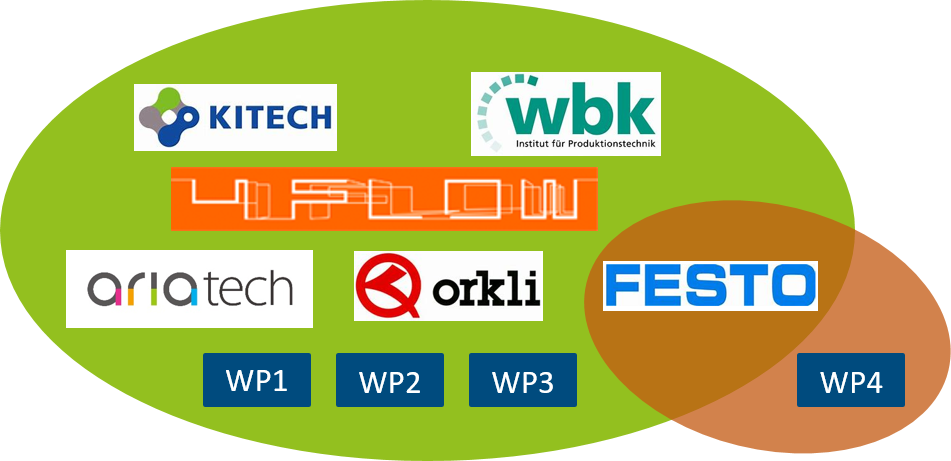Project description SmartCoNeT: Smart Control of Customer-Based Collaborative Manufacturing Networks with Secured Transparency
Background:
Added value nowadays takes place in networks. Currently, networks are often isolated and closed rather than collaborative and transparent. In the long run, individualism results in competitive disadvantages, since competition nowadays not only takes place between individual companies, but also between competing value creation networks (VCN). VCN are subject to high dynamics and disruptive changes. Therefore, flexible reactions of all partners are necessary. Only if the partners (re-)act as a network can competitive advantages be created and the challenges of the so-called VUCA-World (volatility, uncertainty, complexity and ambiguity) be mastered. As a result, the horizontal networking of customers and suppliers in a collaborative value creation process becomes a decisive success factor.
The work of this project was funded for German partners by the Federal Ministry of Education and Research (BMBF) within the “Innovations for Tomorrow’s Production, Services, and Work” Program with the funding codes 02P17D040 to 02P17D050, implemented by the Project Management Agency Karlsruhe (PTKA), for the Spanish partner by the Ministry of Science and Innovation, implemented by the Center for the Development of Industrial Technology (CDTI) with the file number IDI-20191309, and for Korean partners by the Ministry of Trade, Industry & Energy (MOTIE), implemented by the Korea Institute for Advancement of Technology KIAT with the project code P0014149. The international cooperation took place within SmartCoNeT, a project funded under the SMART EUREKA CLUSTER on Advanced Manufacturing programme.
Aim:
The aim of the joint project SmartCoNeT is to enable companies in a network - especially SMEs - to transform locally acting actors into distributed socio-technical systems. Part of this capability is the achievement of a higher level of collaboration, which leads to a higher overall performance of the VCN through a holistic view of the processes of all actors. On the one hand, concrete recommendations for action for collaboration are derived from data-driven models. On the other hand, a reference architecture for data exchange under safety aspects will be developed. The reference architecture becomes an open standard for the implementation of digitized collaboration and comprises existing and future industry 4.0 technologies.
Approach:
The coordination of the four work packages has been spread among the four industry partners to ensure an industry-driven and market-oriented implementation process. The German partners – Festo, 4flow and wbk – will provide the SmartCoNeT consortium with the key findings from the German preparatory activities for the conceptual work. In particular, 4flow will ensure the targeted knowledge transfer and the development of a common conceptual foundation for describing distributed partners of a value chain. Orkli will provide the partners with its expertise from the Ekanban context in developing a decision support system for supply chain management.
The main project work will be done in three use-case specific tandems:
• In the Spanish use case “Comprehensive solution for the supply chain optimization by Ekanban”, 4flow will act as sparring partner in the Orkli-4flow tandem.
• In the South Korean use case “Value chain optimization and Integration platform development based on IoT and Cloud” KITECH and ariatech work together.
• In the German use case “Dynamic network-wide capacity rescheduling for customized serial production” wbk will support Festo.
Festo SE & Co. KG as coordinator of the EUREKA SmartCoNeT and German ReKoNeT project will ensure cross-fertilization between the partners and use cases as well as dissemination of findings beyond the consortium.

| Project Duration: 01.10.2019 – 30.09.2021 | Fund: ca. 1.5 Mio. € |

